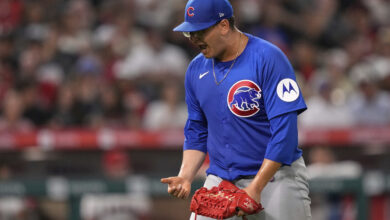Sunday, a Cubs Game Will Matter Again
There’s something deeply numbing about baseball that doesn’t matter. It’s like driving down a straight, empty highway, your right foot sound asleep, having given way hours earlier to the convenience of cruise control.
It’s palpable. The ballpark fills with the low, dead drone of constant conversation. Fans don’t interact with the game; they tune it out, the way a crew of colleagues at happy hour tunes out the blaring local newscast.
The announcers can’t tune things out, but they wish they could. And through no fault of their own, they’ll drift on each other anyway, falling silent for entire sequences of pitches and letting discussions die sadly mid-thought.
Meaningless baseball sucks, for everyone. And for the past four-plus years, the Cubs have played meaningless baseball.
Yes, it’s been genuinely compelling to follow the rebuild, from the assembly of a super-front office to the remarkable collection of young, high-ceiling talent. The signing of Jon Lester was a marking point in the overhaul, as was the coup that netted Joe Maddon.
But Sunday, actual Cubs baseball, at the big-league level in games that count, will matter once again.
Fans will descend on Wrigley, shuffling in dense clusters through the lanes, sidewalks and entrance gates that have all been narrowed into chokepoints by the ongoing slog of construction. They’ll settle into their seats, take a breath or two, and let their eyes drink in the surreal oddity of their baseball cathedral suddenly pregnant with stacks of unfinished crossbeams.
Looming over everything and everyone will be the freshly installed, necessary monstrosity that is the video board, still a rectangular black hole of an eyesore during this article’s publication but sure to come alive in vibrant mega-definition on Sunday.
The board will suck the attention of its guests in an instant, glowing an endless cascade of corporate logos out to a massive sea of eyeballs with wallets.
And then the start time will near, and the screen will clear, and the ads will cast aside to make room for a message:
St. Louis Cardinals (0-0) at Chicago Cubs (0-0)
It’ll be baseball season again, and this time, the baseball world expects the Cubs to compete.
The hype has reached fairly stupid proportions. In January, the Sporting News picked the Cubs to win the World Series. In Vegas, so much cash has moved the Cubs’ way you’d think they flipped rosters with the Nationals or Dodgers. And just this week, Bloomberg Businessweek unveiled its new cover, a jumping Starlin Castro against a backdrop of a dozen-plus smatterings of “Cubs Win!”
The headline: Holy Cow! The Chicago Cubs Finally Have a Winning Business Plan.
Beyond that hype is this more sensible point of agreement: the Cubs aren’t a 90-plus win team yet, but they’re absolutely talented enough to reach .500, and they have a reasonable shot at making the playoffs.
Take FanGraphs, which projects the Cubs to finish 2015 with a record of 84-78. That’s 11 games better than the team finished in 2014, and good for third in the NL Central, behind the Cardinals (88-74) and the Pirates (85-77).
What that gives the Cubs, says FanGraphs, is a 19.3 percent chance of winning the division, and a 23.9 percent chance of winning a Wild Card spot. Add those up, and the Cubs have a 43.1 percent chance of making the playoffs.
These aren’t best-case-scenario projections. They’re extensions of the very reasonable player projections underlying the overall record projection, fully taking into account the individual histories of playing time and the inevitable learning curves for the young core.
What that means is the Cubs are firmly Not Bad, and to be firmly Not Bad is to be a couple of breakout contributions, and a stretch of fortunate health, away from tickling 85-plus wins and a playoff berth.
One year ago, Joe Maddon still called Tampa his home, Jon Lester was ready to begin his ninth season with the Red Sox, and Kris Bryant and Jorge Soler were destined for Tennessee. There was no question of how many games the big-league club would win, because the answer was obvious: not enough to matter yet.
This year is different. The Cubs aren’t pre-established sellers.
The 2015 version of Jason Hammel is a must-help X-factor, not a potential piece to flip in a trade. When a veteran broke out for the Cubs in the past three years, it meant quality prospects were coming back in return. This year, every veteran who breaks out pushes the Cubs that much closer to what they want to be: buyers.
It might be for good, or it might be for a fleeting few weeks or months. But Sunday night, without any equivocation, a Cubs game will matter again.

